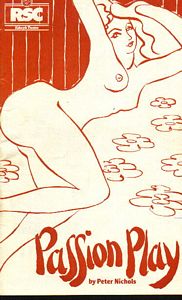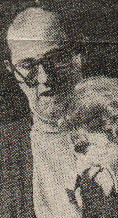PASSION PLAY by Peter
Nichols
Venue: Aldwych 1981
Company: RSC
Directed by Mike Ockrent
Venue: Aldwych 1981
Company: RSC
Directed by Mike Ockrent

Cast in order of
appearance
| Kate | Louise Jameson |
| James | Benjamin Whitrow |
| Eleanor | Billie Whitelaw |
| Agnes | Priscilla Morgan |
| Jim | Anton Rodgers |
| Nell | Eileen Atkins |
| With | Frank Brennan Ian Flintoff Colum Gallivan Neville Jason Claire Jenkins Juliette Mole Sally Nesbitt Patricia Shakesby Kevin Wallace |

Anton Rodgers and
Billie Whitelaw
Reviews
Observer: Robert Cushman
A matter of adultery
Reviews
Observer: Robert Cushman
A matter of adultery
Joke heard at a New York Christmas party: Moses comes down from Sinai with the Tablets and announces, 'First the good news - I got 'em down to 10. Now the bad news - adultery's still in.'
It's still in the theatre as well; for good reason. The falling away of religious sanctions has, in a puzzling way, enriched rather than destroyed the subject. Peter Nichols's Passion Play (Aldwych) - which happens to end with a Christmas party - is about this paradox. James, a restorer of old paintings has for years been comfortably and faithfully married to Eleanor, who sings in a choir. Their children have left home. Kate, who is not quite old enough to be their daughter, determinedly seduces James. She is the common- law widow of their old friend Albert. His legal widow, Agnes, has never forgiven, and it is she who tells.
Benjamin Whitrow plays James and Billie Whitelaw, Eleanor. When Mr Whitrow returns home after his first night of shame - actually a brief and not too satisfactory evening - another actor, identically dressed, walks on stage with him. This is Anton Rodgers, who plays half of Mr Whitrow’s consciousness, the half that prompts him in his alibis, watches to see how they are being received, and persuades him to continue the affair. When Miss Whitelaw has been wised up, she undergoes a similar process of amoebic fission, and acquires Eileen Atkins as a shadow sister, unable to forget and disinclined to forgive. This is a fruitful but potentially irritating device and Mr Nichols handles it with great cunning. He refrains from springing it on us until we have become firmly involved with the characters as single persons, and he uses it to show how hopelessly confused they are. Kate, single-minded hedonist, and Agnes, unremittingly and puritanically vengeful, need no alter egos.
All the characters exist on artistic fringes - Kate is a not very good photographer; Albert was ‘a crusading editor’ - but only James and Eleanor take their half-heartedness to heart. He spends his working days touching up old Christs, she her nights singing the St Matthew Passion; and all the puns, as you may judge from Mr Nichols's title are deliberate. The verb 'to come' starts echoing through the dialogue before so much as a finger has been - you should pardon the expression - laid. James upbraids his Old Masters for the irrelevance of their creed to his present plight; while all that Bach - relayed on the radio - becomes a means of timing his exits from Kate's bed. For all his wit and penetration, Mr Nichols has never been a very neat dramatic architect, and though his irreligious imagery is suggestive, there is never a single moment at which it comes into sharp focus; the final Christmas tableau is superb, but for other reasons.
The second act, in which the affair, detected and over, starts up again, rambles somewhat; but though the play would be neater without it, it would also be poorer. James is reduced to declaring that he doesn't know what love means, and has probably never experienced it; but he's also capable of declaring love for both his wife and his mistress - and, in its moment, each of these contradictory avowals rings true, to him and to us. Possibly what turns him on in Kate is not her sexuality but her rampant sexiness; and a feeling that he owes it to himself, at this late stage, to grab whatever experience is offered. It seems unfair of Eleanor to suffer pain in a world that is supposed to have abolished jealousy - and his attempts to placate her are among the most startling moments in the play. There is in fact quite enough in James to keep two actors employed; and when Mr. Whitrow’s precision gives way to the fleshiness of Mr Rodgers, we think of a thin man with a fat one trying to get out. The actresses are a little less happy; each has a good scene of desperation - Miss Whitelaw's disillusioning, a suicide attempt for Miss Atkins - but Mr Nichols seems to be conscientiously trying with them instead of being instinctively right, as he is with their spouses.
In fact Eleanor's best lines (she knows he’s making secret phone calls because she can hear the change jingling in his track-suit pockets when he goes out jogging) all really relate to James. The revelation of her own past infidelity flies around with nowhere to go. Mike Ockrent's production on a split-level set by Patrick Robertson with resonances domestic, social and psychological – is his smoothest to date.
* * * * *
Sunday Times: James Fenton
Four characters in search of a couple
Passion Play, the new Peter Nichols at the Aldwych, is hardly concerned about expense. There are nine non-speaking parts plus two actors for each of the main characters. It was not enough to have Billie Whitelaw as the heroine – there must be Billie Whitelaw plus Eileen Atkins. The former introduces us to the character in her external mode: the intelligent capable and attractive woman of a certain age, the fulfilled wife whose children have left home and who looks forward to a period of privacy and calm. She dislikes bitterness and when she tries to argue with a friend whose husband has deserted her for a younger woman, we see this as a sign of her maturity and wisdom. One should not live in the past. The deserted wife should create a new life for herself. This seems like common sense.
But there is a fault in this wisdom and sense, a fault which is the author’s ironic business to expose. Miss Whitelaw is so extremely handsome and capable-seeming (although an inadvertent stridency and vocal monotony in the first scene struck me as a defect in her performance) that one can hardly imagine her as vulnerable. It is Miss Atkins’s job, well after the play has established itself, to embody the vulnerable and destructible aspect of the same character. It must have been a strange task for the two actresses to share the part between them. It makes for an exceedingly affecting double performance, which is the focus of interest in the play.
I doubt that Mr Nichols intended any dramatic imbalance between husband and wife, if he seems inevitably to have taken the wife more seriously in her predicament. The husband is played by Benjamin Whitrow and Anton Rodgers, Mr Whitrow at first depicting the suave exterior, Mr Rogers being the ironic inner man. The audience responded at once to this as a comic device on the Morecambe and Wise model. The laughter came thick and fast, and the author revelled in his own professionalism and skill. The women's double act, on the other hand, was introduced on quite different terms. Indeed, with the appearance of Miss Atkins on stage one was aware immediately that the play had been decisively altered. An extra passion, a new susceptibility had been introduced.
The deserted wife already mentioned (played by Priscilla Morgan) had lost her husband to a Dangerous Woman (Louise Jamieson). Now it was Miss Morgan’s g1eeful business to reveal there had been a second Jamieson Raid and that Miss Whitelaw’s husband had been captured. It was at this moment that Miss Atkins entered. The first act of the play showed the wife apparently facing up to her husband’s infidelity with all the maturity with which we had credited her. In the second act (which some critics have taken to be superfluous – a fine judgement with which I disagree) we are shown the real humiliation of the wife.
It comes after the affair is presumed to be over – when, insofar as these things are ever possible, an accommodation has been made. Then the wife must discover that the affair is not over at all, and that her own trust of and friendship with the Dangerous Woman has been betrayed. The effect of this on the wife is truly shattering, since she finds that her moral reserves are just then at their lowest point.
From now on the playwright somewhat alters his own rules as established in the first act: the two pairs of actors cease playing the interior and exterior selves – they become almost independent, embodying alternatives, possibly contained within the same character. The comic element is transcended. The audience is deliberately disoriented, as the implications of the visible drama become less immediately clear. Patrick Robertson’s excellent set springs to life in the most surprising way. We are led into one nightmare from which we awake into a second nightmare. It is as if these succeeding nightmares were the chambers of a vast palace, and we were progressing towards some ultimate nightmare which was waiting to receive us in full pomp and splendour.
The title Passion Play with its religious overtones, points ironically to the absence of the religious element within the play itself. This is a piece about those who have no God but who are cursed with the need for a God. They look to art as a substitute for religion, and art, as it must inevitably do, lets them down. The husband is a picture restorer by profession - and there is a hint that this choice of the nearest profession to that of artist embodies the secret failure of his life. The wife sings in one of the great choirs, and expresses the view that “hundreds of people singing together is the nearest we may ever get to heaven on earth.” It is while she is pursuing this dream of heaven on earth that the husband first takes his opportunity for infidelity - an opportunity which sets up one of the best jokes of the play.
One of the best jokes but also one of the profoundest points. For Mr Nichols was right to pay attention to that peculiar aridity of religious music used in an entirely secular context. For an atheist age, something is inevitably frustrated in our appreciation of, say, the Dies Irae of the Verdi Requiem which rings out so surprisingly in the Aldwych Theatre, and which points us, so magnificently, in the direction of a belief which we have already intellectually ruled out.
Religious music, for the religious, has an infinitely humble function in the act of meditation of the Deity. The atheist rules out the Deity, then turns to religious music as if the Deity having been ruled out, the music will take over all His functions. It is a vain hope. Those who give up religion must give up the religious mode of thought. It is this which is so difficult and depressing to achieve. That is the underlying argument in Passion play which is directed by Mike Ockrent, and makes an exciting start to the theatrical year.